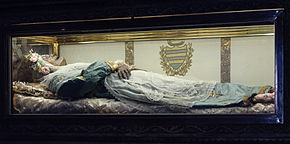age of twelve, Zita became a housekeeper in the house of a rich weaver named
Fontinelli in Lucca, Italy. She stayed with that family for the last forty-eight years
of her life. She would rise several hours before the rest of the family and spend a
considerable part of the time in prayer, including attending daily mass. She carried
out her household duties so perfectly that the other servants were jealous of her,
often suffering abuse and ridicule.
By her patience, she gradually overcame all opposition, and became the
friend and advisor of the whole household. Her master and mistress, realizing
at last what a treasure they possessed in Zita, made her chief house-keeper
and the children’s nurse.
When a local famine occurred, Zita gave away beans to the poor and hungry
from her master's supply of provisions. Unaware of what she had done, the master
decided that the time had come to sell the beans for a great profit. Fearful of her
master's anger, Zita prayed to God for help. When the master checked, he found
that the supply of beans had not diminished.
One morning, Zita stayed in Church longer than she intended after Mass. It
was baking day, and as she traveled home she realized she was far behind in her
work. When she entered the kitchen, she found the bread had already been baked.
As she searched for the servant who had completed this task, she discovered that
there was no earthly explanation. This led to the story that Angels had been
responsible.
When Lucca lay under an interdict from 1231 to 1234, Zita would go into
Pisan territory to receive Holy Communion, a dangerous trip at the time; but
mysterious strangers befriended Zita on her way. During the later years of her life,
when she was relieved of much of the domestic work, she was free to continue her
visits to the poor, the sick, and prisoners to her heart’s content
After foretelling her own death and spiritually preparing for it, Zita died in
Lucca on April 27, 1271. Many residents regarded her as a saint and began to seek
her intercession, to which a large number of miracles were attributed. Some writers
even began referring to the city of Lucca as “Santa Zita” in her honor. The
Fatinelli family, which had once caused Zita such suffering, eventually contributed
to the cause of her canonization.
Soon after Zita's death a popular cult grew up around her, centering on the
church of St Frigidian in Lucca where she attended Mass during her life. Pope
Leo X sanctioned a liturgical cult within the church in the early 16th century. In
1580, her body was exhumed and found to be miraculously incorrupt. This fact
was confirmed by Pope Innocent XII in 1696. In 1748, Pope Benedict XIV added
her name to the Roman Martyrology. Her body is still venerated today in the
Basilica of St. Frediano. During the late medieval era, her popular cult had grown
throughout Europe. In England she was known under the name Sitha, and was
popularly invoked by maidservants and housewives, particularly in the event of
having lost one's keys, or when crossing rivers or bridges.
Each year, a joyous procession is held in Lucca on April 27th her official
Feast. To this day, many families bake a loaf of bread in her honor.


